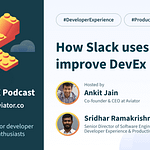About Jesse Adametz:
Jesse is the Director of Engineering for Infrastructure at Twilio Segment — a market leading customer data platform (CDP), that helps you collect, clean, and activate your customer data. Previously, Jesse led Site Reliability Engineering at Invoca — a leader in Conversation Intelligence, and pioneered the Data Engineering function at Graphiq — a Knowledge Graph of over 25 billion curated relations, acquired by Amazon in 2017 to power Alexa.
He is deeply passionate about fostering DevOps as a culture and practice for teams to grow themselves into high-performing service owners, who can deliver reliable, scalable, and secure products to their customers. Jesse is a strong advocate of continuous improvement, sustainable engineering practices, and building diverse teams.
Jesse on Linkedin
Chapters
00:00 Introduction
03:54 Standardization and Software Catalogs
11:49 IDPs - Portals vs Platforms
16:16 Use cases of IDPs
24:19 Scorecards
30:06 IDP Taxonomy at Segment
36:03 Rapid Fire round
Summary
In this episode, Ankit Jain and Jesse Adametz discuss developer platforms (DevEx) and internal developer portals (IDPs). They explore the distinction between portals and platforms, with portals being a UI on top of a spreadsheet-like catalog of services and platforms being more tied into the infrastructure. They also discuss the importance of standardization in IDPs and the challenges of maintaining up-to-date information. Jesse shares how their IDP is integrated into core engineering processes and how it helps with service ownership, risk management, and service readiness. They also touch on the role of IDPs in enterprise readiness and the need for reducing optionality to improve developer experience. The conversation focused on Internal Developer Platforms (IDPs) and their role in improving developer experience.
Jesse also shared insights on the evolution of IDPs, the importance of metrics and scorecards, and creating the right incentives for teams. He also discussed the challenges and learnings from building an IDP at Segment, including the need for standardized taxonomy and the distinction between a portal and a platform. Jesse highlighted the future trends in DX, such as the growth of platforms and the use of coding assistance tools. He recommended books like 'The Phoenix Project' and 'Accelerate' for understanding DevOps and DX.
Keywords
developer platforms, DevEx, internal developer portals, IDPs, standardization, service catalog, platform teams, producer-consumer challenge, software quality, enterprise readiness, Internal Developer Platforms, IDPs, developer experience, metrics, scorecards, incentives, taxonomy, portal, platform, trends, coding assistance, books
Takeaways
Developer platforms (DevEx) and internal developer portals (IDPs) play a crucial role in improving developer experience and productivity.
There is a distinction between portals and platforms, with portals being a UI on top of a catalog of services and platforms being more tied into the infrastructure.
Standardization is important in IDPs to reduce optionality and improve software quality.
IDPs are primarily used by platform teams, but there is a need to involve product teams in providing up-to-date information.
Integrating IDPs into core engineering processes can help with service ownership, risk management, and service readiness.
IDPs contribute to enterprise readiness by ensuring operational rigor, monitoring, and higher reliability.
Reducing optionality in IDPs can lead to a better developer experience and more efficient workflows. Internal Developer Platforms (IDPs) play a crucial role in improving developer experience by providing tools, metrics, and standardized processes.
Metrics and scorecards are important for measuring and tracking developer productivity and service readiness.
Creating the right incentives is essential for motivating teams to adopt IDPs and improve system reliability.
Building an IDP requires careful consideration of taxonomy, including service catalog, organizational structure, and product hierarchy.
The future of DX includes the growth of platforms and the use of coding assistance tools, as well as the integration of knowledge systems for better access to documentation and code.
References:













Share this post